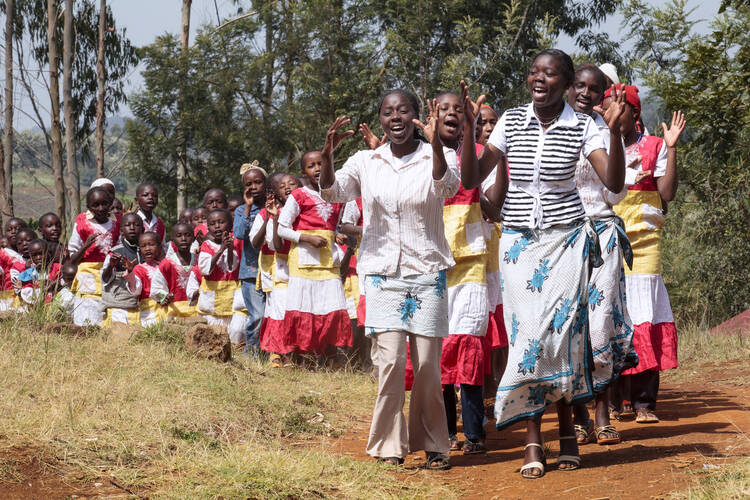Last month I published a number of articles about the surveys being used to gather information from Catholics all over the world in preparation for next October’s Synod on the Family.
In the last of my four pieces, I tried to find out what was being done in other parts of the world. In a number of regions of the world I couldn’t find anything, usually because those areas had not yet begun the process of soliciting information. (The Vatican seems to have a rolling process; countries like New Zealand and Australia were asked for response by early January; places like France have only just turned their data now.)
Among the comments to my pieces was a letter from Father Joseph G. Healey, M.M. Fr. Healey is a Maryknoll Missionary priest who has worked in East Africa for nearly 50 years, publishing many books and developing Small Christian Communities. He wrote with concern that my piece did not mention the process that was ongoing in East Africa.
I invited Fr. Healey to write back to me after their process had ended and share something about the Kenyan experience with the Synod surveys. Fr. Healey’s comments to me proceed below.
"The Local Church in Kenya, and in particular the Kenya Conference of Catholic Bishops (KCCB), is happy to share its pastoral experiences of family and marriage in Kenya with the Catholic Church worldwide." These are the opening words of the 38-page document sent to Rome on 15 April 2015 called 'Results of the Consultation in Kenya on the 46 Questions in the Lineamenta on The Vocation and Mission of the Family in the Church and Contemporary World.'
Kenya carried out a long and in-depth consultation and the answers to all the 46 questions were compiled from many sources: Catholic dioceses and parishes, departments and offices in the Kenya National Catholic Secretariat, academic institutions, lay movements, other ecclesial associations especially of married couples and Small Christian Communities (SCCs). For example, Nakuru Diocese produced a report of 25 pages.
Kenyan lay people were eager to discuss the challenges and pastoral solutions for cohabitation (called “come we stay”), high dowry payment (one of the main reasons why 60% of the Catholic couples in Nairobi Archdiocese have not sacramentalized their marriages and so cannot receive communion), how to communicate with the young generation (especially the Generation Y of 18-22 year olds) and better parenting. A key insight is that lay people are saying, “We are the church and family and marriage are our responsibilities.”
The final compilation was done by an eight member team led by Kenyan Bishop James Maria Wainaina of Murang’a Diocese and included one priest, two religious sisters, one married laywoman, two married laymen and one single man.They tried to respond to Pope Francis’ call to be “be bold and creative” in finding new pastoral solutions (“think outside the box”).
In response to the key Preliminary Question, “Does the description of the various familial situations in the Relatio Synodi correspond to what exists in the church and society today [such as in Kenya]?” the Kenyan report said, “An overall yes.” Thenit named some “missing aspects” from the Kenyan experience and perspective.
For instance, the questions have a Western tone or viewpoint and sometimes lack a Global South perspective. Many felt the questions did not directly touch the local African reality and concerns. For example, 71% of the 35 million people living with HIV/AIDS in the world live in sub-Saharan Africa. HIV/AIDS is not mentioned in the Lineamenta, yet it deeply affects marriage and family life.
Nor is Female Genital Mutilation, a significant issue here, and the importance of Small Christian Communities (SCCs) here in promoting family and marriage ministry in the world today. (In Kenya the Catholic Church has 45,000 Small Christian Communities (SCCs) that create a communion of families in neighborhoods.)
Also, in the Lineamenta children are seen as the objects and receivers of pastoral and missionary care. But children can also be the subjects of promoting family relationships and family life, active participants in church life (for example, doing the Readings and dancing in the liturgy) and agents of evangelization (the importance of the Pontifical Missionary Childhood [PMC] in Catholic family life through its “children helping children” motto). In Kenya there are also households run by children; this, too, needs acknowledgment and consideration.
Our consultation gave a strong affirmation to family and to a family life that is truly Christian and truly African. It stressed the importance of the ministry of accompaniment – with engaged couples, married couples and different categories of wounded families – and offered pastoral strategies for good and responsible parenting. And it affirmed the work of Tangaza University College, a constitutive college of the Catholic University of Eastern Africa (CUEA) in Nairobi, which offer two courses for future priests and other pastoral workers in which married people teach about the family, family values and marriage.
It also recommended that future Lineamenta offer fewer questions with simpler language and construction of sentences.
More background information can be found on the Kenya Conference of Catholic Bishops (KCCB) Website (http://www.kccb.or.ke) and the Small Christian Communities Global Collaborative Website and “Facebook Page” (www.smallchristiancommunities.org).
The two delegates from Kenya to the Fourteenth Ordinary General Assemblyof the Synod of Bishops in Rome in October, 2015 are Cardinal John Njue, the Archbishop of Nairobi and Chairman of the Kenya Conference of Catholic Bishops (KCCB) and Bishop James Maria Wainaina, the Bishop of Murang’a Diocese. Hopefully a Kenyan married couple will also be chosen to participate in the synod.








